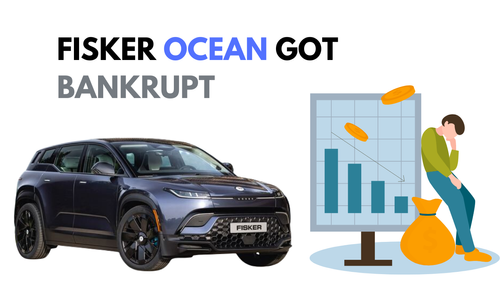Fisker Ocean Faces Bankruptcy: Chapter 11 Filed
By Mohit Kumar

56557 Views
Check out the implications of Fisker Ocean's bankruptcy filing under Chapter 11 and gain insights into the challenges confronting EV startups amidst a competitive market environment.

Key Highlights:
- undefined
- undefined
- undefined
- undefined
Fisker Group Inc., the subsidiary of California-based EV startup Fisker Inc., has officially filed for Chapter 11 bankruptcy protection in the District of Delaware. The filing comes amid “various market and macroeconomic headwinds,” as stated by the company.
Seeking Buyers
- Discussions Underway: Fisker is in advanced discussions with financial stakeholders regarding debtor-in-possession financing and the sale of its assets.
- Asset Sale: The company is actively looking for buyers to purchase its remaining assets.
Production Halt and Financial Struggles
- Production Paused: Production of the Fisker Ocean SUV was halted at Magna’s factory in Austria due to inventory buildup and price cuts.
- Austrian Subsidiary: Filed for reorganization a week before the Chapter 11 filing.
- Financial Woes: The company has been burning through approximately $70 million per month in 2023, totaling nearly $1 billion.
Historical Context
- Second Bankruptcy in a Decade: This marks the second bankruptcy for Fisker owners in 10 years. The first occurred in 2014 with Fisker Automotive, the maker of the Karma extended-range EV.
- Production Shortfall: Fisker planned to build 20,000 to 23,000 Ocean EVs but only assembled around 11,000, with about 5,000 still in inventory.
Company Statement
A Fisker spokesperson stated, “Fisker has made incredible progress since our founding, bringing the Ocean SUV to market twice as fast as expected in the auto industry and making good on our promise to deliver the most sustainable vehicle in the world. But like other companies in the electric vehicle industry, we have faced various market and macroeconomic headwinds that have impacted our ability to operate efficiently. After evaluating all options for our business, we determined that proceeding with a sale of our assets under Chapter 11 is the most viable path forward for the company.”
Future Operations
- Employee and Vendor Payments: Fisker will file motions to continue reduced operations, including paying employee wages and benefits, preserving certain customer programs, and compensating necessary vendors.
- Asset-Light Model Concerns: Fisker’s "asset-light" model, which enabled rapid market entry, could pose challenges for Ocean EV owners due to a limited stock of spare parts, complicating repairs and potentially deterring buyers since the company lacks its own manufacturing facility.
Fisker’s current situation highlights the challenges faced by EV startups in a competitive and evolving market.